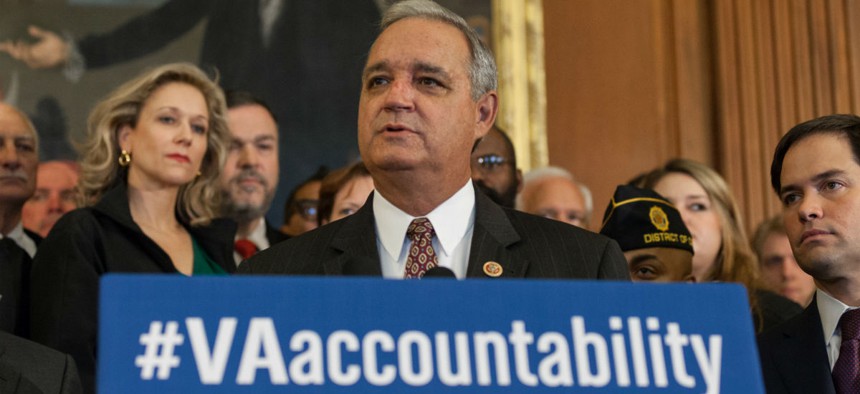
House Veterans’ Affairs Committee Chairman Jeff Miller, R-Fla., criticized VA's "tradition" of transferring bad apples. Flicker user Speaker John Boehner
Debate Over Making It Easier to Fire Feds Dominates VA Hearing
House panel discusses legislation that would give the VA secretary sweeping authority to remove corrupt or poor-performing employees.
A House panel on Tuesday discussed at length legislation that would make it easier to fire employees at the Veterans Affairs Department.
H.R. 1994, sponsored by House Veterans’ Affairs Committee Chairman Jeff Miller, R-Fla., would give the VA secretary much more flexibility to fire corrupt or poor-performing employees. The 2015 VA Accountability Act would make it easier to fire all misbehaving employees, not just top officials. The 2014 Veterans Access, Choice and Accountability Act, which became law last year, makes it easier to get rid of senior executives at the department engaged in wrongdoing; H.R. 1994 expands that authority to the rest of the VA workforce.
The Veterans’ Affairs Subcommittee on Economic Opportunity on Tuesday reviewed nine pieces of legislation, including H.R. 1994. During the session, Republicans and Democrats asked several questions about the Miller bill related to accountability, due process and firing federal employees.
Lawmakers and other stakeholders have grown increasingly frustrated that the department has not fired any employees in connection with the data manipulation and excessive wait times for vets that erupted last year at the Phoenix, Ariz., facility. Problems involving data manipulation, mail mismanagement, drug overprescriptions and retaliation against whistleblowers have come to light since then at several other VA facilities across the country. According to Miller, VA has only attempted to discipline eight people for wait time manipulation.
“From Philadelphia to Reno, Nev., to Nashville, Tenn., to Phoenix, VA’s tradition of transferring problem workers, putting them on paid leave or simply allowing them to go virtually unpunished continues because current civil service rules make it extremely difficult to properly hold employees accountable,” Miller said in an earlier statement about the legislation. “I know this because high-ranking VA officials – people who work directly for the secretary – have told me so behind closed doors.”
On Tuesday, Miller said that he believes “99 percent of the more than 300,000 VA employees are dedicated and hardworking, and are not part of the problems that exist at VA.” But the department’s “tradition” of transferring bad apples or putting them on paid administrative leave makes H.R. 1994 necessary.
The legislation would allow the secretary to remove any VA employee based on performance or misconduct; the employee could file an appeal to the Merit Systems Protection Board within seven days of his or her removal. MSPB would have to rule within 45 days of the appeal filing. Due process for most of the federal workforce now requires that agencies notify employees within 30 days of an adverse action (including removal), provide them with seven days to respond and an opportunity to defend themselves.
H.R. 1994 also would extend the probationary period for new VA employees from one year to 18 months, and allow the secretary to extend that even further. “When an employee’s probationary period ends, their immediate supervisor would be required to make an affirmative decision that the employee is qualified for their position before full civil service protections are granted,” according to a press release summarizing the bill. During Tuesday’s hearing, Miller said the nonprofit Partnership for Public Service suggested the probationary period extension to give managers more flexibility. Most VA medical professionals already have a two-year probationary period.
The legislation would include a provision limiting the secretary’s authority to fire or demote an employee who is a whistleblower. But the American Federation of Government Employees, which strongly opposes the bill overall, said H.R. 1994 would have an adverse effect on whistleblowing. Reducing the rights of front-line employees will “chill disclosures” because of a fear of firing, as well as destroy morale and undermine employee retention, said AFGE General Counsel David Borer. “Stripping job protections from non-management employees will result in more mismanagement in the form of retaliation, discrimination, patronage and anti-veteran animus,” Borer said during the hearing.
Borer rejected the idea that it is impossible to fire federal employees, pointing to a recent Merit Systems Protection Board report that explained due process in the federal civil service. The upshot of that report was that removing poor performers and those engaged in misconduct while also protecting employees from discrimination and retaliation are not hopelessly incompatible goals. But they’re also not easy to accomplish efficiently. Still, MSPB said that agencies already have tools at their disposal to discipline and fire employees.
More than 77,000 full-time, permanent, federal employees were discharged as a result of performance or conduct issues from fiscal 2000 to fiscal 2014, according to the MSPB report. In fiscal 2014, 2,572 VA employees were terminated or removed for disciplinary or performance reasons, according to the Office of Personnel Management.
Several veterans’ groups, including Veterans of Foreign Wars, Iraq and Afghanistan Veterans of America, and Concerned Veterans for America expressed support H.R. 1994. The bill has 44 co-sponsors, including three Democrats.
The VA has “significant” concerns with the bill related to due process because it allows the secretary to fire employees “with no notice, pretty much on the spot,” said Catherine Mitrano, the department’s deputy assistant secretary for resolution management, on Tuesday.
Still, panelists and lawmakers questioned how the VA culture can change if poor actors aren’t held accountable. “There are good people [in VA], but nothing happens to the bad guys – ever,” said Rick Weidman, executive director of policy and government affairs at the Vietnam Veterans of America.







